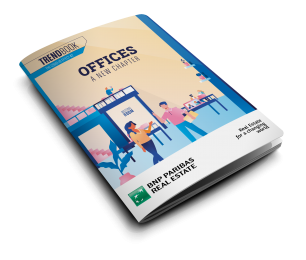The office: an environment whose purpose is solely to work or a space for interaction and socialising?
Respondents were asked whether they saw the office as a single purpose environment or a place for social interaction.
Overall, more than half of employees across the seven countries surveyed saw the office as a place to come together in. The Dutch (61%), Belgians (56%), Italians (52%) and French (51%) are the most convinced that the office is a social space.
This finding seems to be reinforced by age, with the under-30s most likely to consider the office as a collaborative environment. Indeed, in Italy, the Netherlands and France, 69%, 66% and 66% respectively appreciate meeting people and socialising at work.
Combing the answers of the different respondents across the various countries, the ideal office appears to be a place that allows a certain amount of autonomy to be maintained, while offering the possibility of meeting and exchanging ideas.
It is true that the various lockdowns have revealed the need for shared spaces where interaction is the driving force of creativity. The need to reconnect has been felt by many and the office seems to one of the main environments where this can take place.
What is essential in offices?
In France and Germany, the first criteria favoured by service sector employees are services and shops in and around the workplace (50%). In Belgium, 48% favour access to public transport, but almost as many want local services (47%). These services include concierge services, gyms, but also spaces where people can come together socially (cafeterias, coffee shops, lounges, etc.).
In the Netherlands and the UK, privacy and individual work spaces are the most popular (55% and 53%). Spaniards, on the other hand, consider spaces that encourage collective work to be a priority (56%). The British and Italians also want to ensure better connectivity (53% and 49%).
Services seem to be at the heart of the interviewees' concerns. This trend once again confirms the importance of a service-oriented and experiential workplace in dynamic business areas. Furthermore, numerous studies corroborate the idea that the work environment has a direct impact on the well-being and performance of employees.

The office is and will remain the place where people socialise. It must be a calm, planned, well-organised space, the source of a successful experience, capable of reassuring and encouraging collaboration
Remote working and the new relationships to housing
A furnished room or at least a dedicated space seems, overall, to be important for this European panel. On average, 51% of the respondents in the seven countries surveyed consider this to be a key criterion. Adaptable space comes second with a quarter of the responses, which confirms the need for accommodation adapted to the new working methods in order to accommodate the tools and comfort necessary for productivity.
Remote working: What are the expectations and incentives for employees in Europe?

Download the TrendBook "Offices: A New Chapter"
In this TrendBook, find out what changes are happening across Europe and what exactly being back in the office now looks like.




